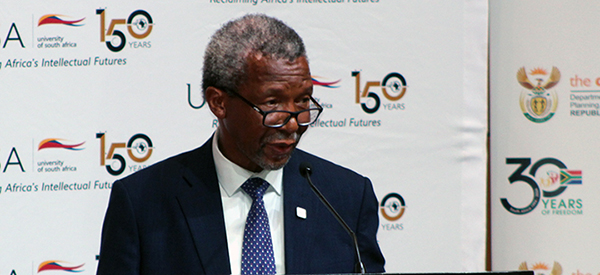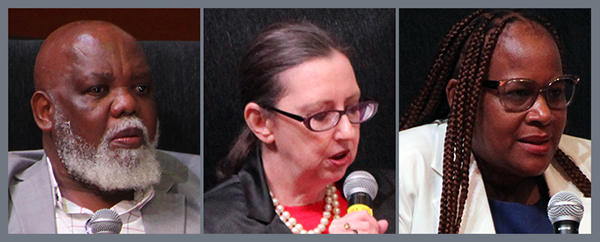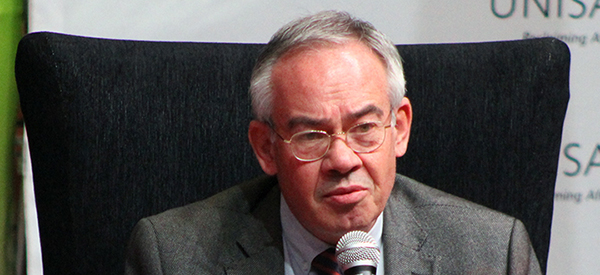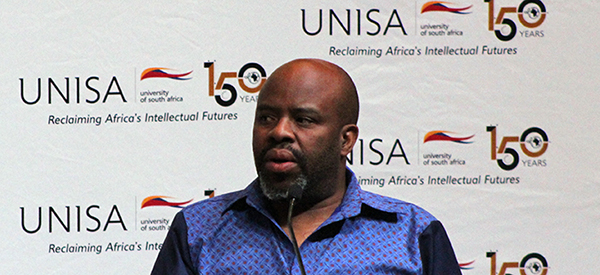News & Media
Perspectives on South Africa's 30-year democracy
The Department of Planning, Monitoring and Evaluation (DPME), in partnership with Unisa and the National Press Club, co-hosted a roundtable panel discussion on the 30-Year Review Report (1994-2024) on South Africa's democracy, themed Perspectives on 30 Year Review Report and the road ahead, on 23 May 2024 at the Muckleneuk Campus, Tshwane.
The dialogue follows the recent handing over of the 30-year review report to President Cyril Ramaphosa by DPME Minister Maropene Ramokgopa and her Deputy, Minister Pinky Kekana, ahead of the country's general elections on 29 May 2024. The report sought to comprehensively analyse South Africa's political, social and economic transformation since the establishment of democracy in 1994 and formulate concrete recommendations that will inform and guide the nation's future development agenda. "In addition, the report provided key evidence for the development of the new Medium-Term Strategic Framework (MTSF) 2024-2029, which serves as a five-year plan of government towards the implementation of the National Development Plan Vision 2030," said the DPME.
Sweeping winds of change
The analysis from the panel discussion aimed to stimulate conversations and reflections from the report, aiming at crucial lessons learned throughout the 30-year journey, with top experts in economics, ethics, socio-politics and African studies giving their expertise on the aforementioned areas.

Prof Solomon Magano, Acting Vice-Principal: Institutional Development
In his opening address, Prof Solomon Magano, Acting Vice-Principal of Institutional Development, outlined the discourse for the event, affirming that it is a handy tool for the country and its citizens to analyse and review how democracy has impacted the lives of all South Africans, especially the poor and previously disadvantaged, in the last 30 years.
"The commemoration of thirty years of independence and the evaluation of the democratic dividend affords any society in transition an opportunity to showcase its progress and mediate and/or mitigate against any democratic fault lines. At the centre of society's transitions is the question of how human beings sustain and improve the human condition and ecological sustainability," he affirmed.
Magano explained that since 1994, the world experienced international activism by South African leaders such as Presidents Mandela and Mbeki and, very recently, by President Ramaphosa on the Palestinian / Israeli conflict as well as the wars in the Sudan and the DRC. In addition, he stated that the university played a crucial role in the education of some of the political leaders of Sudan.
Magano stressed that many people hold firm that they have not yet been touched by the winds of change sweeping through the country since the advent of the new democratic dispensation. However, he stated: "This critique notwithstanding, none can dispute the fact that a lot more has changed for the better for millions of South Africans who lived under atrocious socio-economic conditions pre-1994."
Views from the panel
Prof Paul Zilungisele Tembe, a visiting Associate Professor at the China Foreign Affairs University in Beijing, argued about the plight of people living in townships. He stated that their lives have not seen much improvement. Tembe explained that service delivery hits them the hardest and that they make meagre wages, much of which is spent on public transport commuting to work. However, he emphasised that for the township economy to grow, there must be a stimulus to drive Small, Medium and Mirco Enterprises (SMMEs).

Prof Paul Zilungisele Tembe, Visiting Associate Professor at the China Foreign Affairs University in Beijing; Prof Narnia Bohler-Muller, Divisional Executive at the Human Sciences Research Council's Developmental, Capable and Ethical State Research Division; and Dr Kefiloe Masiteng, Head of the United Nations Resident Coordinator's Office in South Africa
Prof Narnia Bohler-Muller, Divisional Executive at the Human Sciences Research Council's Developmental, Capable and Ethical State Research Division, stated that there must be professionalisation of the public service, combatting of crime and corruption, climate change, improved service delivery and that there must be trust in research and development in improving the aforementioned areas.
Analysing critical areas from the report, Dr Kefiloe Masiteng, Head of the United Nations Resident Coordinator's Office in South Africa, stated that post-1994, the country had global and continental aspirations, and the one part with much emphasis was eradicating poverty. "Everybody aspires for a prosperous society that offers jobs and access to higher education institutions; however, the projected population did not expand in tandem with economic growth, and this, she said, was not accurately predicted."
She said the economy was struggling to grow for a long time due to poverty and inequality. However, she stated that among many improvements, "the country has improved on social transformation, and neonatal and infant mortality have declined due to conditions that have improved life expectancy".
Inequality remains a challenge
National Planning Commissioner (NPC), Dr Sibusiso Mkwananzi, on a review of the 10-year targets of the National Development Plan (NDP), stressed that significant work is needed to improve the strides taken so far. She explained that inequality remains a challenge. "We targeted to decrease the Gini coefficient from 0.69 to 0.6 in 2030. Currently, we are at 0.63. Covid-19 gave us a setback. We wanted to decrease unemployment from around 25% to 6%. Currently, we are at around 32.9%. In addition, we aimed to decrease poverty levels from 39% to 0%, and we are currently at 25%."
Trust in public institutions
Prof Dirk Kotzé, Lecturer at the Department of Political Sciences, stated that the past three decades have been a significant milestone for the country to review the promises, pledges and targets planned since 1994. He stressed that the country functions in a highly globalised context in that it has to flow with external forces. He explains: "The price of petrol, wheat, the rand and commodities are not determined here, but rather elsewhere in the globe. We are not in charge of these aspects and therefore have to accommodate these fluctuations, which, in turn, influence our economy."

Prof Dirk Kotzé, Lecturer, Department of Political Sciences: College of Human Sciences
He stated that the decline of public trust in public institutions, parliament, political parties and institutions by the public has been well documented. As a result, for a state to function correctly, there must be a high level of trust by the public. He gave an example of the South African Revenue Services (SARS), which, he said, featured heavily in the state capture period but managed to bounce back despite the setback.

Dr Robert Nkuna, Director General, Department of Planning, Monitoring and Evaluation
Concluding the panel discussion, Dr Robert Nkuna, Director General of the Department of Planning, Monitoring and Evaluation, acknowledged the inputs that the panel experts highlighted from the 30-year review, including progress and challenges, including persistent inequality and unemployment. He stressed the need to professionalise public service and stimulate township economies. "Despite improvements in life expectancy and social conditions, substantial work remains to achieve the National Development Plan's targets," he posited.
* By Godfrey Madibane, Acting Journalist, Department of Institutional Advancement
Publish date: 2024/05/27

 Unisa co-hosts G20 community outreach in the Eastern Cape
Unisa co-hosts G20 community outreach in the Eastern Cape
 Unisans gain membership of prestigious science academies
Unisans gain membership of prestigious science academies
 Advocating for disability transformation through servant leadership
Advocating for disability transformation through servant leadership
 Unisa Press continues to illuminate the publishing space
Unisa Press continues to illuminate the publishing space